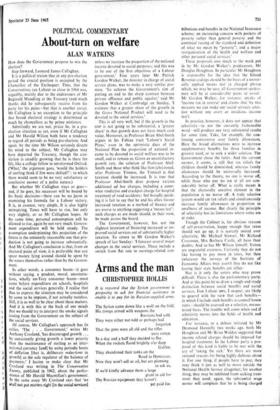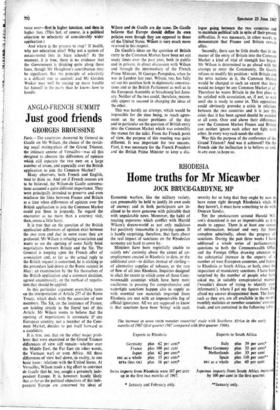About-turn on welfare
POLITICAL COMMENTARY ALAN WATKINS
How does the Government propose to win the election?
Step forward, Leonard James Callaghan.
It is a political truism that in any pre-election period the crucial position is occupied by the Chancellor of the Exchequer. Thus, that the Conservatives ran Labour so close in 1964 was, arguably, mainly due to the endeavours of Mr Reginald Maudling at the Treasury (and much thanks did he subsequently receive from his party for his pains—but that is another story). Mr Callaghan is no exception to the principle that broad electoral strategy is determined as much by chancellors as by prime ministers.
Admittedly we are not, praise be, in a pre- election situation as yet, even if Mr Callaghan and Mr Harold Wilson both have a tendency to regard all periods as being pre-election. And again, by the time Mr Wilson seriously directs his mind to the subject, Mr Callaghan may have departed the Treasury, though the con- viction is steadily growing that he is there for life, like a college fellow in unreformed Oxford. ('What,' the argument goes, 'would the holders of sterling think if Jim were shifted?': to which there would seem to be no very satisfactory or conclusive answer of a polite nature.)
But whether Mr Callaghan stays or goes— and, if he goes, his successor will be bound by his basic decisions—there can be no ]farm in examining his formula for a Labour victory. It is, in essence, very simple., It is also highly uninspiring. Taxes will have to rise, but only very slightly, or so Mr Callaghan hopes. At the same time, personal consumption will be allowed to rise, again by not very much. Govern- ment expenditure will be held steady. The assumption underpinning this projection of the future is the eminently reasonable one that pro- duction is not going to increase substantially. And Mr Callaghan's conclusion is that, from an electoral point of view, it is preferable that any spare money lying around should be spent by the voters themselves rather than by the Govern- ment.
In other words, a consumer boom—it goes without saying, a prudent, moral, unostenta- tious, wholly un-Tory consumer boom—must come before expenditure on schools, hospitals and the social services generally. I realise that thus to express the situation may be considered by some to be impious, if not actually tasteless. Still, it is as well to be clear about these matters. And it is with this at the back of our minds that we should try to interpret the smoke signals issuing from the Government on the subject of the social services.
Of course, Mr Callaghan's approach has its critics. 'The . . . Government,' writes Mr Anthony Crosland, 'has discouraged growth ... by consistently giving growth a lower priority than the maintenance of sterling as an inter- national currency [and] by using periodic bouts of deflation [that is, deliberate reductions in growth] as the sole regulator of the balance of Payments.' I hasten to make clear that Mr Crosland was writing in The Conservative Enemy, published in 1962, about the perfor- mance of Mr Harold Macmillan's government. In the same essay Mr Crosland says that 'we shall not put matters right (in the social services] unless we increase the proportion of the national income devoted to social purposes; and this was to be one of the first objectives of a Labour government.' Five years later Mr Patrick Gordon Walker, the minister in charge of social service plans, was to make a very similar pro- mise. `To achieve the Government's aim of putting an end to the sharp contrast between private affluence and public squalor,' said Mr Gordon Walker at Cambridge on Sunday, 'I estimate that a greater share of the growth in the Gross National Product will need to be devoted to the social services.'
This is all very well, but if the growth in the GNP is not going to be substantial, a 'greater share' in that growth does not have much cash value. Moreover, as Professor Brian Abel-Smith argues in his Fabian tract 'Labour's Social Plans,' even in the optimistic days of the National Plan the proportion of national in- come to be devoted to social welfare was to be small, and to remain so. Given an unsatisfactory growth rate, the solution of Professor Abel- Smith and those who think like him (christened, after Professor Titmuss, the Titmice) is that taxation should be increased. It is true that Professor Abel-Smith does propose various additional ad hoc charges, including a some- what vindictive and crackpot charge for hospital treatment of road accidents: but broadly speak- ing it is fair to say that he and his allies favour increased taxation as a method of finance and are averse to anything suggesting a 'means test': such charges as are made should, in their view, be made across the board.
The Government, however, has not the slightest intention of financing increased or im- proved/social services out of substantially higher taxation. To return to Mr Gordon Walker's speech of last Sunday: 'I forecast several major changes in the social services. These include a switch from flat rate to earnings-related con-
tributions and benefits in the National Insurance scheme; an increasing concern with pockets of poverty rather than general poverty and the continual raising of the st4ndard and definition of what we meats by "poverty"; and a major reorganisation of the health and welfare and other personal social services.'
These proposals owe much to the work put in by Mr Gordon Walker's predecessor, Mr Douglas Houghton. In particular Mr Houghton is responsible for the idea that the Inland Revenue codings should be the basis of a univer- sally applied means test (a charged phrase which, we may be sure, all Government spokes- men will be at considerable pains to avoid : Mr Gordon Walker, for instance, speaks of 'income tax in reverse' and claims that 'by this measure we can make our social services selec- tive without any overt or invidious income test').
In practice, however, it does not appear that selectivity—to use the currently fashionable word—will produce any very substantial results for some time. Take, for example, the con- tinuing controversy over family allowances. Here the broad alternatives were to increase supplementary benefits for those families in greatest need, or to seek a wider solution. •The Government chose the latter. And the current answer, it seems, is still that tax reliefs for children should be diminished, whereas family allowances should be universally increased. According to the theory, no one is worse off, while those who pay no tax at all are con- siderably better off. What is really meant is that the electorally sensitive element in the population is no worse off. A truly selective system would cut tax reliefs and simultaneously increase family allowances in proportion to smallness of income. But clearly the principle of selectivity has its limitations where votes are at stake.
Though the Cabinet is, for obvious reasons of self-preservation, happy enough that taxes should not go up, it is scarcely united over selectivity. Mr Michael Stewart, Mr Richard Crossman, Mrs Barbara Castle, all have their doubts. And so has Mr Wilson himself. Voters are ungrateful creatures. Certainly they do not like having to pay more in taxes, but then (whatever the surveys of the Institute of Economic Affairs may assert) they do not like having their state benefits cut either.
Nor is it only the voters who may prove difficult. There is also the parliamentary party. And at this point let us draw a rough-and-ready distinction between social benefits and social services. Few Labour MPS, I suspect, are likely to quarrel with the view that cash benefits— in which I include such benefits as council house rents—should be assessed on a selective, means- tested basis. The trouble will come when and if selectivity moves into the fields of health and education.
For instance, in a debate initiated by Mr Desmond Donnelly two weeks ago. both Mr Houghton and Mr Brian Walden suggested that income related charges should be imposed for hospital treatment. In the Labour party a pro- posal of this kind is liable to be met with thes cry of 'taxing the sick.' Yet there are more rational reasons for being highly dubious about it. For one thing, if people have to pay, they may think it just as well to move outside the National Health Service altogether; for another thing, they may be inhibited from seeking treat- ment they need; again, the substantial wage earner will complain that he is being charged twice over—first In higher taxation, and then in higher fees. (This last, of course, is a political objection to selectivity of considerably wider application.) And where is the process to stop? If health, why not education also? Why not a system of means-tested fees in State schools? At the moment, it is true, there is no evidence that the Government is thinking quite along these lines, though Mr Houghton's contribution may be significant. But the principle of selectivity is a difficult one to control; and Mr Gordon Walker may well be storing up more trouble for himself in the party than he knows how to handle.































 Previous page
Previous page